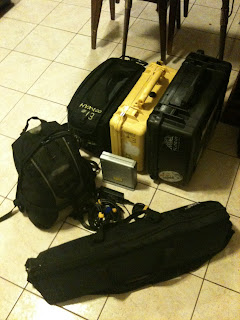How to Survive your First Day in Hanoi
It was our first day in Hanoi and Justina and I were keen to get up early and explore the city. The night before, Chris recommended an early morning walk to the lake. "It is about 5-10 minutes from here. It’s really easy to get to, just go down the street and take a right, then follow the big one-way road right to the lake,” said Chris
“Perfect, thanks Chris!” Justina and I replied in unison.
As self-proclaimed “seasoned travelers”, an early morning stroll to the lake was going to be a breeze for us…or so we thought. Once we reached the lake, it didn’t take long for us to find ourselves lost in the city of Hanoi. Relying solely on Google maps and the advice of well-meaning (but non-English speaking) locals, we attempted to navigate our way from the lake, back to the hostel.
 |
| Trúc Bạch Lake, Vietnam |
After 30 minutes of wrong turns and following our Google map through a sea of motorbikes with no familiar landmarks in sight, the panic began to set in. With every new street appearing identical to the last and only 10 minutes until our morning meeting, we began to worry that we may never find our hostel. Luckily we were able to catch a ride with a cyclo driver who (eventually) got us where we needed to be. In hindsight, there are many lessons to be learned from getting lost in a new city. Here are ours:
1. Bring a physical map
Google maps can be a great resource for making your way around a new city, but following a little dot on a small screen can prove to be challenging in certain situations, especially when walking through side streets or paths off the beaten track. If you are keen on using Google maps, make sure to have a physical map on you, and have your destinations plotted in advance. This can help with avoiding mishaps like the one we had today on our mini-adventure.
2. Know the local language
When traveling to a new country where the local language is not your native tongue, communication is key to a smooth experience. Understanding basic words and phrases, including directions, can prevent you from miscommunications that could lead you in the wrong direction. You’ll be surprised at how much time and energy you can save by knowing how to say phrases like “where can I find...” or “I want to go to...”.
3. Agree on your price before getting on the cyclo
 |
| Riding a Cyclo in Vietnam |
Our cyclo driver today happened to be extremely kind and honest, but that may not always be the case. When travelling in countries where bartering is commonplace, proceed with caution by agreeing on a price with your driver before jumping into any vehicle. This will ensure that you are not left to pay a hefty price for a short journey.
4. Take a photo of the intersecting street signs near your hostel/hotel.
If there was one thing that saved us today, it was having a photo of the intersecting street signs that were near our hostel. Our cyclo driver was not familiar with the name of our hostel, and could not identify the location by referring to Google maps, so having a picture of the intersection where our hostel was located, really helped him get us home.
5. Look both ways before crossing the street, and then look again!
Crossing the street in Hanoi is like playing a real life game of frogger. With motorcycles and taxis coming at you in both directions, the only way to get around the city without getting hit is by “just going for it”. Saying this, the keys tips that we learned are:
1. Look both ways before you go
2. Walk slowly
3. Walk in a straight line, and;
4. Don’t hesitate or change your pace
You may find that you will get honked at a lot, but rest assured that more often than not, the drivers just want to inform you that they are there. In Hanoi, traffic lights are a rarity and traffic rules are more like guidelines, and the road is alive! Make sure you pay close attention!
6. Stay calm
Staying calm was a key factor in us getting back to our hostel. Getting lost in a foreign city can be extremely stressful and it is easy to panic when you encounter difficult or confusing situations. If you do find yourself in an unpleasant situation, take a few deep breaths, and then stop to assess the problem. Sometimes, our adrenaline can make the issue appear worse than it is. By stabilizing your mental and emotional state, you’ll be able to make better judgments and get yourself out of sticky situations.
7. Cake for breakfast is always a good idea!
 |
| Eating Cake in Hanoi, Vietnam |
In a moment of calm during the storm, we stopped for some delicious cake from a local bakery. So, this isn’t really a lesson, but our last piece of advice is to enjoy your trip! If you don’t normally divulge in sweets, this is the time to do it! What happens in Hanoi stays in Hanoi…except those extra few pounds, you’re probably going to take that back home with you. So I guess the moral of the story here is that, when in doubt, eat some cake!










